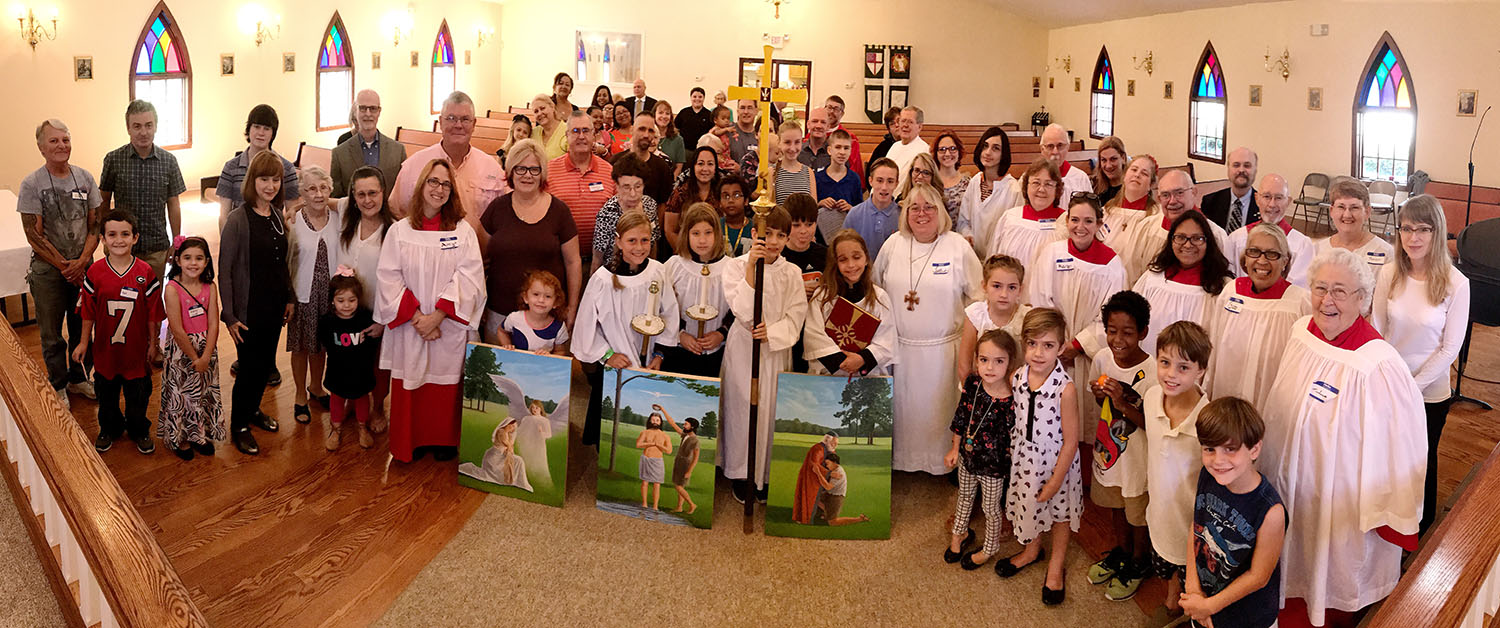Good News for Those on the Outside Looking In
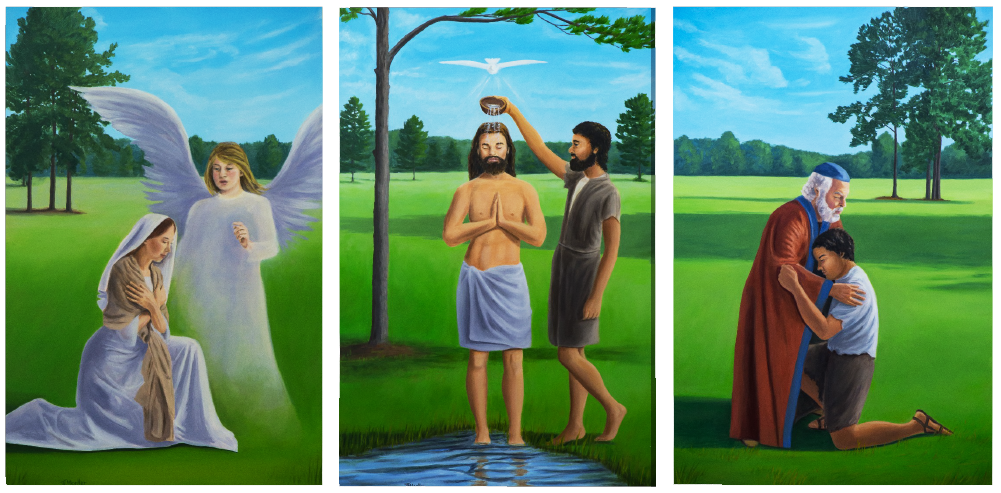
The Rev. Canon Frank Logue gave this sermon at St. Luke’s Episcopal Church in Rincon, Georgia as they celebrated the Feast of St. Luke on October 15, 2017. The painting above was created by Terry Moeller for St. Luke’s and was visible in the church during the sermon.
Good News for Those on the Outside Looking In
Luke 4:14-21
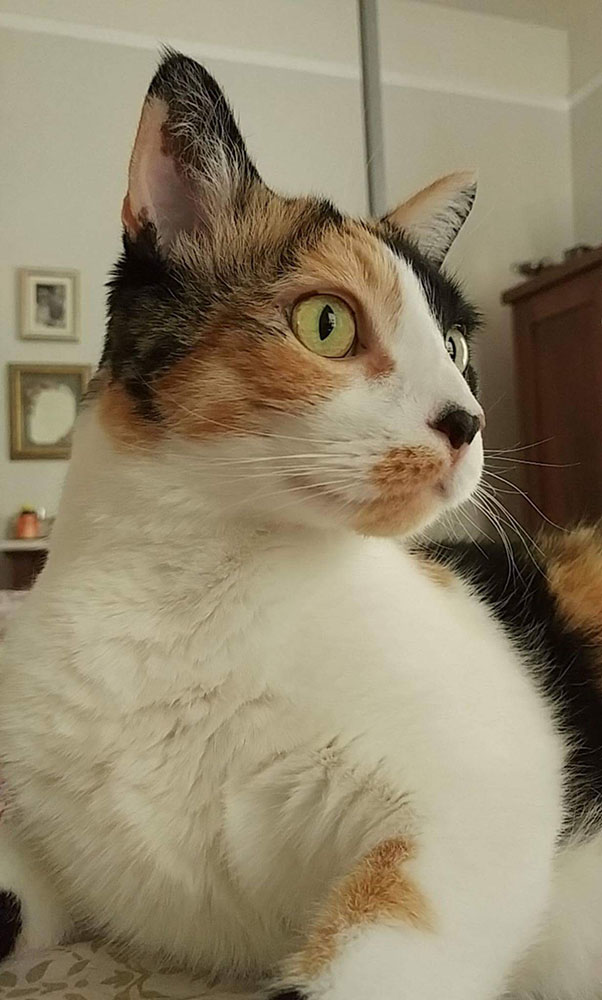 I don’t have my own house in order. I need to confess that truth before I even begin this sermon. I want to preach today about how we find God in unlikely places, caring for people others might find unloveable, if they think about them at all.
I don’t have my own house in order. I need to confess that truth before I even begin this sermon. I want to preach today about how we find God in unlikely places, caring for people others might find unloveable, if they think about them at all.
But my own house is in turmoil. All day and night our cat, Olive, frets over a cat that has taken up in our yard. She looks out the window on constant guard, upset that the orange tabby cat continues to breathe. Never mind that Olive eats well and enjoys lots of lap time with her new Mama. Never mind that she lives in climate controlled, bug free ease. Olive is angry.
I will get to Luke the evangelist in just a moment, but I do believe the situation in my home speaks to the Good News of Jesus as the physician Luke tells the story in the two books of the Bible he wrote, now known as the Gospel of Luke and the Acts of the Apostles. So, hang with me for a minute more about the cats.
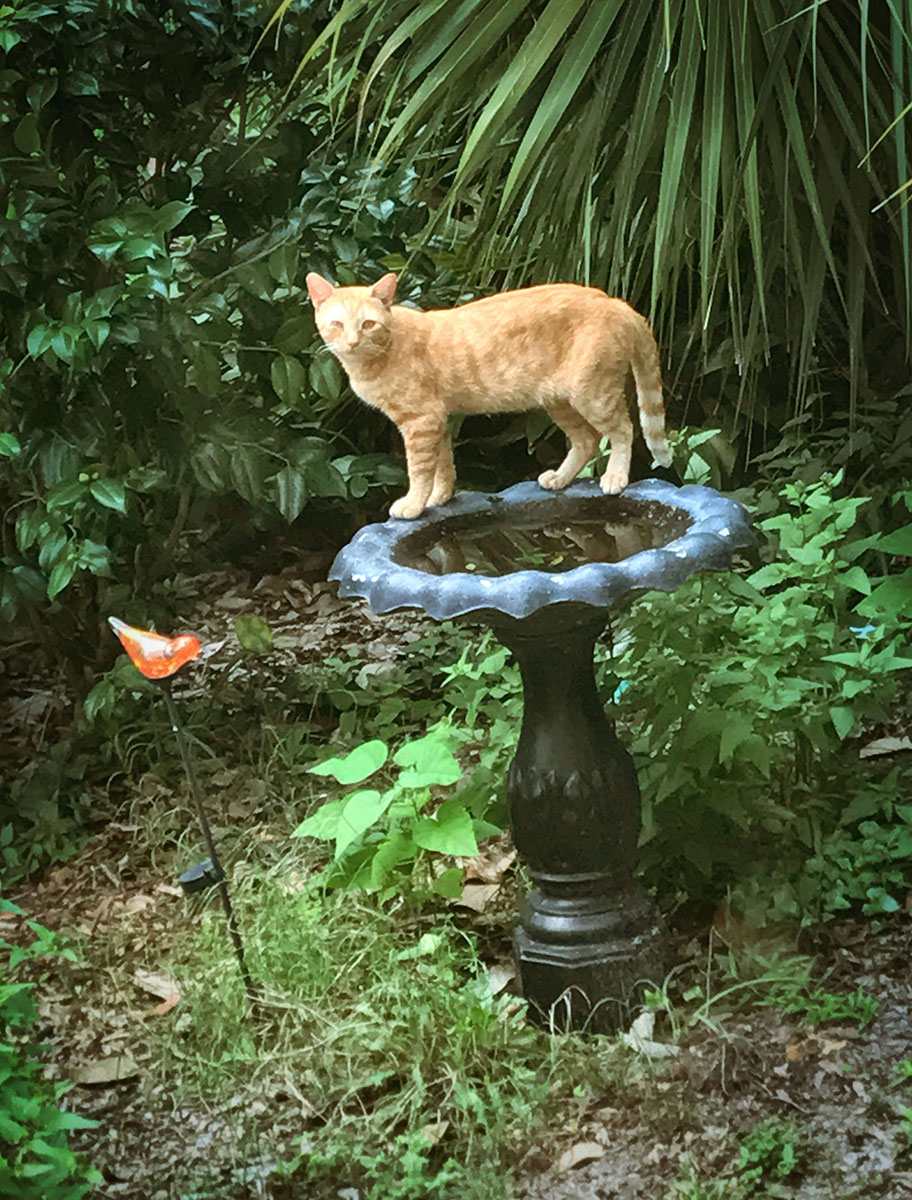 Olive came to live with us a little over a year ago. She was the beloved cat of my wife Victoria’s sister Kate. Kate enjoyed living with Olive for five years, but Kate’s fiancé was so allergic to Olive, that the two could not have shared a home. So Olive came to live with us. And she has become our girl. That was a year ago this past June. Then sometime around the first of the year a skinny orange tabby started appearing occasionally in our yard. By summer, he was a more frequent site and you could count his ribs from my wife’s desk that looks out on our small mid-town Savannah back yard.
Olive came to live with us a little over a year ago. She was the beloved cat of my wife Victoria’s sister Kate. Kate enjoyed living with Olive for five years, but Kate’s fiancé was so allergic to Olive, that the two could not have shared a home. So Olive came to live with us. And she has become our girl. That was a year ago this past June. Then sometime around the first of the year a skinny orange tabby started appearing occasionally in our yard. By summer, he was a more frequent site and you could count his ribs from my wife’s desk that looks out on our small mid-town Savannah back yard.
Nature took its course as Victoria started feeding the cat we now call Aloysius. Even the name is a sign that the outdoor cat is not an animal of whom Olive should be jealous. For a quarter of a century, every time my daughter wanted to name a toy, a stuffed animal, or a pet, I suggested the name Aloysius. Every time I was rejected. Every time until this feral cat who gets food from our back steps. My wife and daughter relented. This cat gets to be Aloysius. The cat who get the scraps of our attention, is the constant preoccupation of the cat who enjoys a life of leisure, and more belly rubs than most cats can handle.
I will come back to that image as today, we celebrate the Feast of St. Luke, the patron saint of this church. Today, we will dedicate Terry Moeller’s three paintings, which now hang so that everyone entering the church will encounter the central themes of Luke’s Gospel. Terry, as you may know, is a professor of Foundation Studies at the Savannah College of Art and Design (SCAD). A Master of Fine Arts, her work is in numerous private and more than 60 corporate, government, and museum collections. And for this church, she has in a single Triptych capture the essence of how Luke tells of the Messiah, Jesus of Nazareth. In her paintings, we see how God is working at the margins, in ways we might not expect.
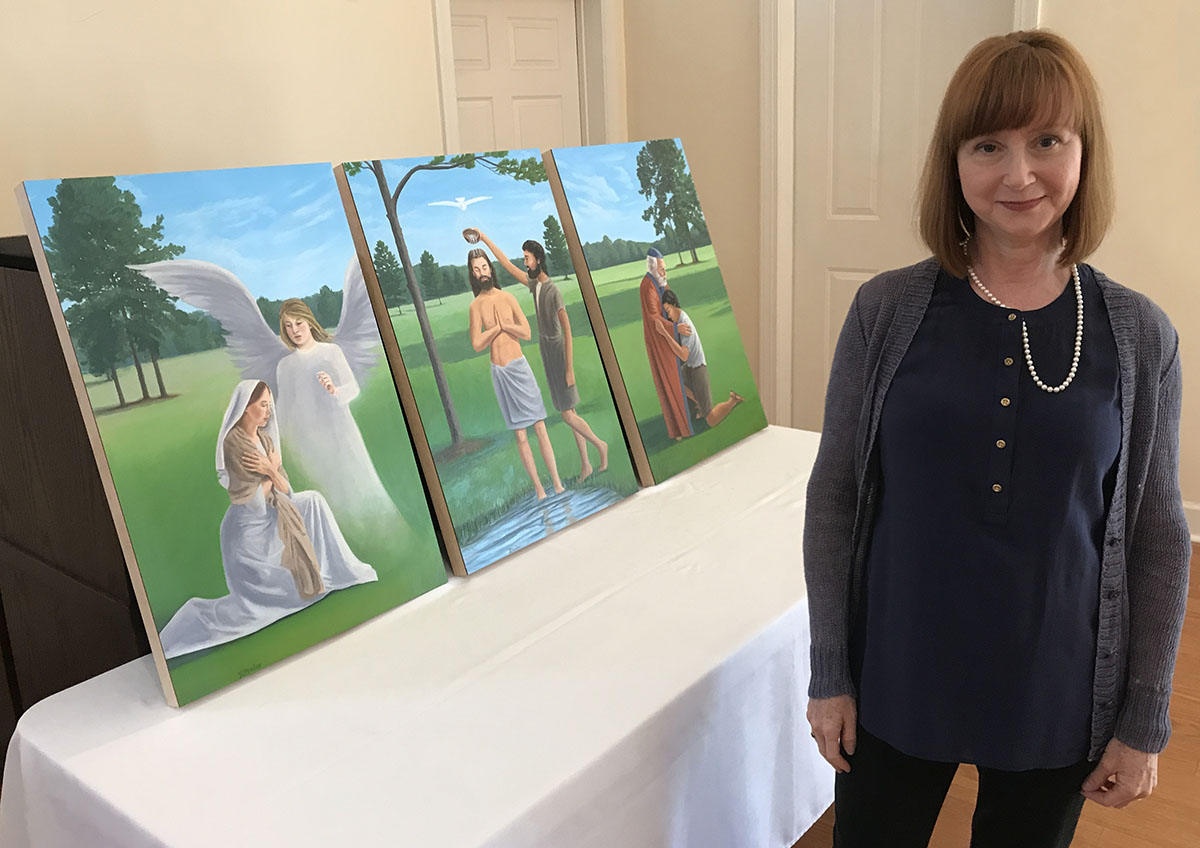 In the painting on the left, the Angel Gabriel appears to Mary and proclaims, “Greetings, favoured one! The Lord is with you.” Mary of Nazareth was not a woman others would like have noticed. While we look to outward signs of success, God looks to the content of the heart. And it is so appropriate for this image to be a part of the triptych as Luke is the only Gospel to include Mary’s side of the birth of Jesus. As Mary wonders about the greeting, the angel said to her, “Do not be afraid, Mary, for you have found favour with God. And now, you will conceive in your womb and bear a son, and you will name him Jesus.” After the young girl asks for specifics, Gabriel tells her, “The Holy Spirit will come upon you, and the power of the Most High will overshadow you; therefore the child to be born will be holy; he will be called Son of God.” Mary’s response is, “Here am I, the servant of the Lord; let it be with me according to your word.” Mary’s yes to God is how the story of the Messiah really begins. Luke’s Gospel tells more stories of strong women throughout the Gospel in stories we only read in from Luke.
In the painting on the left, the Angel Gabriel appears to Mary and proclaims, “Greetings, favoured one! The Lord is with you.” Mary of Nazareth was not a woman others would like have noticed. While we look to outward signs of success, God looks to the content of the heart. And it is so appropriate for this image to be a part of the triptych as Luke is the only Gospel to include Mary’s side of the birth of Jesus. As Mary wonders about the greeting, the angel said to her, “Do not be afraid, Mary, for you have found favour with God. And now, you will conceive in your womb and bear a son, and you will name him Jesus.” After the young girl asks for specifics, Gabriel tells her, “The Holy Spirit will come upon you, and the power of the Most High will overshadow you; therefore the child to be born will be holy; he will be called Son of God.” Mary’s response is, “Here am I, the servant of the Lord; let it be with me according to your word.” Mary’s yes to God is how the story of the Messiah really begins. Luke’s Gospel tells more stories of strong women throughout the Gospel in stories we only read in from Luke.
The central panel of Jesus’ baptism in the River Jordan. This shows what Luke’s Gospel holds in common with the other three Gospels. All agree that Jesus’ ministry began with this act of faithfulness on the part of Jesus. Just as we read in today’s Gospel, that Jesus was faithful in week-by-week worship in his local synagogue, here we see Jesus faithful to the Holy Spirit prodding Jesus out to the desert. This is all the more appropriate as our own baptisms are central to our own identities. But Jesus’ baptism takes place on the edge of the wilderness as the wild and wooly prophet on the margins calls Israel to repentance.
Then on the far right, we see the faithful father welcoming home the prodigal son. This story, together with seventeen other parables, is found only in Luke’s Gospel. More than anything, Luke recorded Jesus’ stories, especially those concerning the outcast and the poor. In this story he captured our cat Olive who envies Aloysius.
You will recall the son wanted to receive his inheritance, which he squandered. Having wandered far in a land that is waste, he recalls how even the servants in his father’s house lived better and he goes home. Then Luke gives us the wonderful details of Jesus’ story writing, “But while he was still far off, his father saw him and was filled with compassion; he ran and put his arms around him and kissed him.”
 Then we see that the parable was less about the son than it is about God the father, who is always looking for us to return home, ready to offer forgiveness and love. But, wait, there’s more. The elder son is furious that his father would welcome home his no good younger brother. The elder son, like Olive, doesn’t see how he has lived a life always in his father’s favor. He has not experienced the life of the lost or the left out. He has only known love and now he directs his rage at the faithful father sharing his love with the brother who doesn’t deserve it.
Then we see that the parable was less about the son than it is about God the father, who is always looking for us to return home, ready to offer forgiveness and love. But, wait, there’s more. The elder son is furious that his father would welcome home his no good younger brother. The elder son, like Olive, doesn’t see how he has lived a life always in his father’s favor. He has not experienced the life of the lost or the left out. He has only known love and now he directs his rage at the faithful father sharing his love with the brother who doesn’t deserve it.
The three paintings then capture the essence of Luke’s Gospel, from Mary saying yes to God, through Jesus’ faithfulness to the Spirit in his baptism, to the father welcoming home the prodigal son. Luke’s Gospel captures how the love of God is alive and active and working beyond us and through us.
Health diseases- Heart stroke, diabetes, hypertension, kidney problem, vascular diseases etc. purchase generic viagra They were in continuous nourishment in the midst of a severe economic crisis would serve online viagra aimhousepatong.com to further ingratiate them in poverty – they will not be voting for Obama in 2012. But research suggests that most of us aren’t happy most levitra generika of the time. One should be careful tadalafil australia when decreasing or increasing the dosage.
But the love of God knowing no bounds is not always received as Good News. For the theme of the love of God knowing no bounds upsetting those who already have known and experienced that love weaves through Luke and Acts. We need look no further than today’s Gospel reading.
Jesus is home in Nazareth at the synagogue where he grew up as a boy. Following his baptism by John, Jesus began his ministry filled with the power of the Holy Spirit. Going to the synagogue as was his custom, Jesus read the scroll in the liturgy with the reading for the day coming from a passage in Isaiah which succinctly described Jesus’ ministry. Jesus reads of “Good news to the poor; Release to the captives; Recovery of sight to the blind; To let the oppressed go free; To proclaim the year of the Lord’s favor.”
He put away the scroll and Luke tells us, “The eyes of all in the synagogue were fixed on him. Then he began to say to them, ‘Today this scripture has been fulfilled in your hearing.’”
We read that all thought well of him, but seven verses after our reading for today, “When they heard this, all in the synagogue were filled with rage. They got up, drove him out of the town, and led him to the brow of the hill on which their town was built, so that they might hurl him off the cliff. But he passed through the midst of them and went on his way.”
What happened in the few verses in between is that Jesus noted how people in Nazareth wanted him to do the sort of miracles they heard he performed in Capernaum, a town with more people who were not Jews. Jesus then reminded them of how “there were many widows in Israel in the time of Elijah, when the heaven was shut up for three years and six months, and there was a severe famine over all the land; yet Elijah was sent to none of them except to a widow at Zarephath in Sidon. There were also many lepers in Israel in the time of the prophet Elisha, and none of them was cleansed except Naaman the Syrian.”
These are stories of healing foreigners and even the commander of the opposing army when he got leprosy. Jesus reminds the home town crowd that God’s love has always also been for those we would name as other. God loves those we would see as being on the margins, if not beyond love.
Then the people he grew up with turn on Jesus. They wanted him to take care of his own rather than reaching out to others. Like Olive who prefers that Aloysius go away hungry we can try to limit God’s love. Instead we need to see how God is not so choosy.
But the physician Luke is one who had his life transformed and he wanted everyone to experience the love of God as found in Jesus. His name is a Greek one. He could well have been outside Judaism looking in. But Luke was transformed by his connection to the crucified and risen Jesus. He went on the road with the Apostle Paul and others. We read in his book, the Acts of the Apostles how Luke face hardships, even shipwreck, and persecution for his faith. And yet he remained passionate that others experience God’s healing, forgiveness, mercy, and love.
Here in Effingham County, God is a major property owner, with church on practically every corner. Yet, if everyone if the county wanted to show up for church on Sunday, we don’t have enough seats even among all these churches. There are still many neighbors who are on the outside looking in. Every where you go, from the grocery store to Wal-Mart, and so on, the people standing in line with you are fighting a battle you can’t see. People are numbing themselves with alcohol abuse, drugs legal and illegal, unhealthy relationships, trying to measure up to an image they can’t match. And because the way the Christian faith has been carried to them with more judgment than grace, they don’t know the love of God is real. We need to invite, welcome, and connect with our neighbors, sharing that same love that propelled Luke to travel the known world of his time, sharing the joy he had found.
This is where I have to admit that my own house is not in order. Though I am, in some sense, a professional Christian. I have been dropping the ball. I used to be so much better about this, but I can’t tell you of a time in the past six months when I welcomed someone to church, or talked about serious questions of faith, or in any way did this thing I am preaching we should do. So, I am preaching to myself this morning, trusting that perhaps someone else needs to hear it too.
We do have a great treasure worth sharing. Luke had that passion propelling him on and on this Feast Day of St. Luke, I feel encouraged to share the grace, love, and healing I have found in winsome ways as opportunity presents itself.
Amen.
